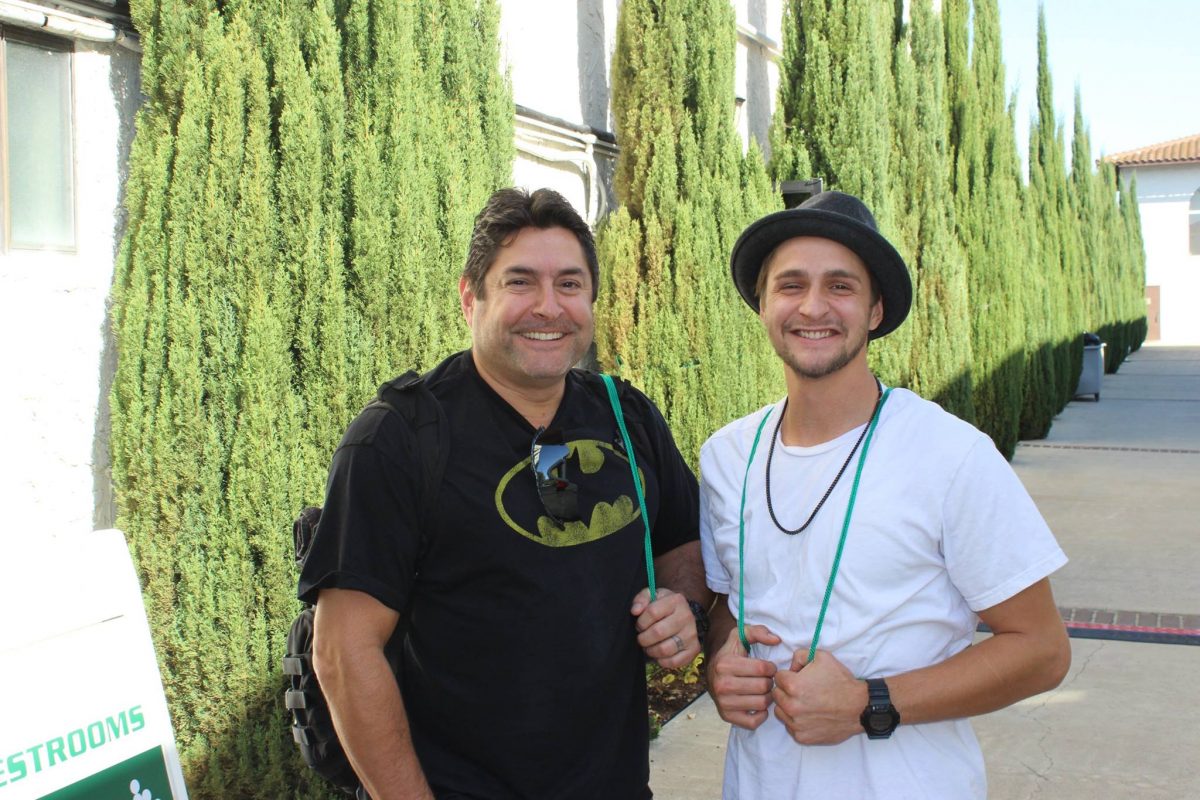(Editor’s Note: This interview was first published on Patreon.com/wphlive for WPH Pledge supporters. Get your news, breaking stories, interviews, instructional & coaching videos and written text, live handball matches and more at Patreon.com/wphlive)
WPH Press
John Robles Unplugged originally appeared on WPH Patreon in January of 2020
The WPH had a chance to sit down with Pro Tour legend and Grand Master John Robles and nothing was off limits. The Southpaw discusses everything from his handball inspiration, why handball fans either loved him or hated him, how he practiced, life before and after handball, his tournament preparation and much more. Enjoy!
Inspirations in handball: I started playing handball at the age of 13 because my dad Lou and older brother Mike started playing at the YMCA. Mike was 25 and he and my dad were looking for some father-son time so they went to the YMCA and heard the handball smacking off the concrete walls and started playing. I tagged along because I wanted a free lunch after handball, so they would have beers and I would play pinball and eat pretzels. When I was 16 Naty Alvarado, Sr. came to our club to play in a very prestigious tournament called “The Rose.” I had never seen handball played at that level and I just couldn’t believe it, I never thought I’d be able to play at that level.
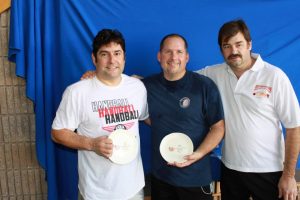 Best advice ever received: I was playing Naty Sr. in a pro stop and I was just in awe. Throughout the first half of the first game I would run up to Naty and tell him “great shot,” and chase the ball to give it to him to serve. Naty called a timeout and I said, “Naty, are you upset, am I blocking you?” Naty gave me the best advice I’ve ever received. He said, “Forget about who you are playing and just play the ball.” I never forgot that and to this day that’s what I teach and how I always played.
Best advice ever received: I was playing Naty Sr. in a pro stop and I was just in awe. Throughout the first half of the first game I would run up to Naty and tell him “great shot,” and chase the ball to give it to him to serve. Naty called a timeout and I said, “Naty, are you upset, am I blocking you?” Naty gave me the best advice I’ve ever received. He said, “Forget about who you are playing and just play the ball.” I never forgot that and to this day that’s what I teach and how I always played.
In terms of strategy and developing the hook, my brother Mike Robles had a very big influence (both Robles brothers were known for hitting huge hooks).
Love him or hate him: When I played people either loved me or hated me. I looked at the court as a stage and I was there to perform and have fun. I always knew my time on the pro tour would come to an end, so I just wanted to enjoy myself and be competitive. The older fans always liked me because I played the mental game and could manipulate my opponent, while the younger fans thought I was a showboat
How to play against an opponent you don’t like or who’s game gives you a hard time: Just like Naty Sr. told me, “Play the ball, not the opponent.”
How to play against a hard hitter: I was playing John Bike and struggling and I came out of the court and my friend and great handball mind Boak Ferris said to me, “John, you need to slow the ball down in your mind.” This game is all about timing, just like baseball. The reason the pitcher’s fastball starts to get hit in the fourth or fifth inning is because the hitters are timing him, same in handball
Beating his older brother: Of course, Mike would always beat me. We played in a Southern California league when I was about 22 and he was 34, I was playing for Long Beach and he was playing for Los Cab. Mike was mostly a doubles player but they put him in at number one singles and I was playing number one singles for Long Beach. I ended up beating him pretty easily in two games.
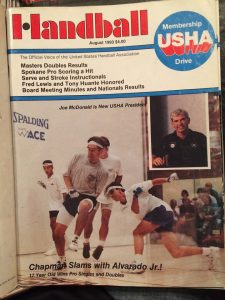 Clubs that helped in playing pro handball: When I first started out I was in Spokane and played at the Spokane Club. Eventually I moved to Seattle and played at the Washington Athletic Club (WAC). I can’t tell you how great those clubs and the people were to me, helping me with whatever I needed to play pro handball.
Clubs that helped in playing pro handball: When I first started out I was in Spokane and played at the Spokane Club. Eventually I moved to Seattle and played at the Washington Athletic Club (WAC). I can’t tell you how great those clubs and the people were to me, helping me with whatever I needed to play pro handball.
How to practice against inferior players: When I was on the tour I never had pro level players to play, so I would tell my opponents I’m going to spot you points, not for you, but for me. I needed to spot them a ridiculous amount of points to maintain my concentration and to eliminate my hand errors on defense. I’d also play people barefoot, holding a folding chair, or anything to make it fun.
John Robles career highlights:
Two-time 23-and-under singles world champion
Ranked #3 on the Spalding/Gatorade USHA Pro Tour
USHA National Pro Singles Finalist (1994)
15-time USHA National Masters Champion
David Chapman’s toughest opponent: I only beat David in singles one time in 1991, but David’s dad Fred always said to me that I was David’s toughest opponent because I got in his head. “The game starts in the locker room,” is how I always felt. When David hit a flat roll out and the crowd went wild, I’d walk past him and say, “You’re supposed to do that.” He didn’t like it. I could hang with David (and John Bike) but he’d always got me on stamina.
Full contact handball: Dan Armijo and I were friends off the court but I hated playing him – he was sloppy and always running into me. We were playing in Lincoln, NE in a pro stop in 1995 and ran under me and took out my legs (after we already stepped on one another a few times throughout the match). I got up and pushed him and we were swearing at each other and he pushed me back. John Bike came running into the court to split us up. We didn’t get fined or suspended but we should have.
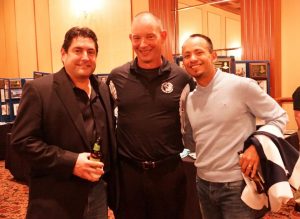 Life before and after handball: Although I started playing handball recreationally at 13, I was a baseball guy, I played baseball 24/7, first base and outfield. Jaime Parades was my college baseball coach but we never played each other in handball at the time. (Today) I haven’t hit a handball for real in a couple of years (maybe I’ll come back when I’m 60). I’m starting a 501c3 foundation to inspire kids as Batman, and that along with my full-time job have kept me really busy
Life before and after handball: Although I started playing handball recreationally at 13, I was a baseball guy, I played baseball 24/7, first base and outfield. Jaime Parades was my college baseball coach but we never played each other in handball at the time. (Today) I haven’t hit a handball for real in a couple of years (maybe I’ll come back when I’m 60). I’m starting a 501c3 foundation to inspire kids as Batman, and that along with my full-time job have kept me really busy
Tournament preparation: Once I got on the pro tour I was there to have fun but I also wanted to win. I trained every day, eating right, lifting weights, cardio, and playing. I’d shut it down about three days before the tournament, maybe just bike light. When the tournament started and the referee called 0-0, I felt like I could eat nails. I played every opponent like he took something from me, that’s where I got my tenacity
Hesperia Practice matches: Chris Watkins and I would team up to play John Bike and Naty Alvarado, Jr. in weekly doubles matches in the neighborhood where we all lived. Those matches were intense, like tournament matches. Nobody wanted to lose. Chris and I would get them some of the time.
What John enjoys most in handball now: I really like working with advanced level players and teaching the mental side of the game – how to disrupt the rhythm of your opponent when he’s on a roll, how to understand your game. There are two aspects of the game that I think are so important: unconscious incompetency and conscious competency – as you mature, you know what shots you can make and what shots you can’t – most younger players don’t understand this. When I talk about the two levels of competency, it’s usually an “ah-ha” moment for the older players. Once you have been playing the game for a long time you know where your shots are going and usually you know where your opponent’s shot is going, that’s when the game becomes relaxing and a lot of fun
Bypassing qualifying: Dan Armijo and I were the only players to not have to qualify for the tour. I went to the Nationals in 1994 to play doubles and Vern (Roberts) said there was a spot open in the pro singles draw. I decided to play and ended up beating Vern, Scott Kelley and John Bike to make the final before losing to Chapman. That got me ranked 14th. Two guys dropped out of the first stop of the next season in New Mexico, so Vern called me up and said I was invited to play (the top 12 at that time received automatic invites). I ended up climbing into the top five and settled in at number four, with my highest ranking at number three. I played the tour for about seven years before left elbow surgery and a young family took me out
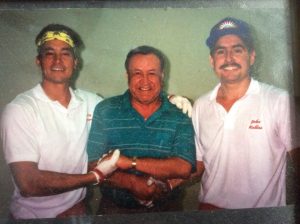 Self-practice: It’s so important to practice by yourself in the court to develop the muscle memory, the correct contact point, the angle of your swing and your body, and your confidence. I would set up a handball can on the front wall and hit 50 or 60 back wall shots, aiming for the can. I’d get in such a groove that I could hit the can four or five times in a row.
Self-practice: It’s so important to practice by yourself in the court to develop the muscle memory, the correct contact point, the angle of your swing and your body, and your confidence. I would set up a handball can on the front wall and hit 50 or 60 back wall shots, aiming for the can. I’d get in such a groove that I could hit the can four or five times in a row.
Thank you to John Robles for letting us into the mind of one of the 1990’s most prolific and exciting handball pros. Photos courtesy of John Robles.
David Fink
WPH Senior Writer










